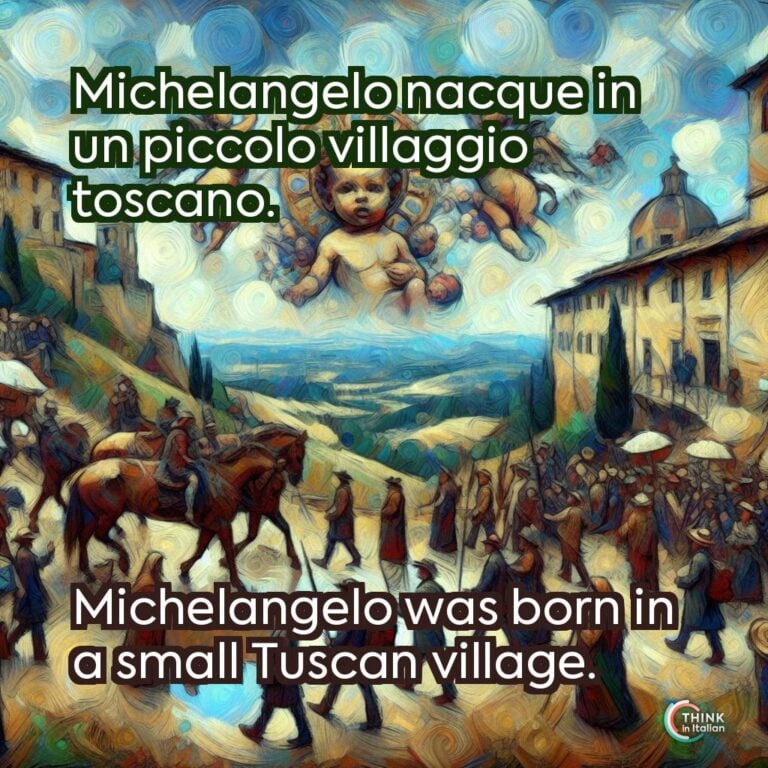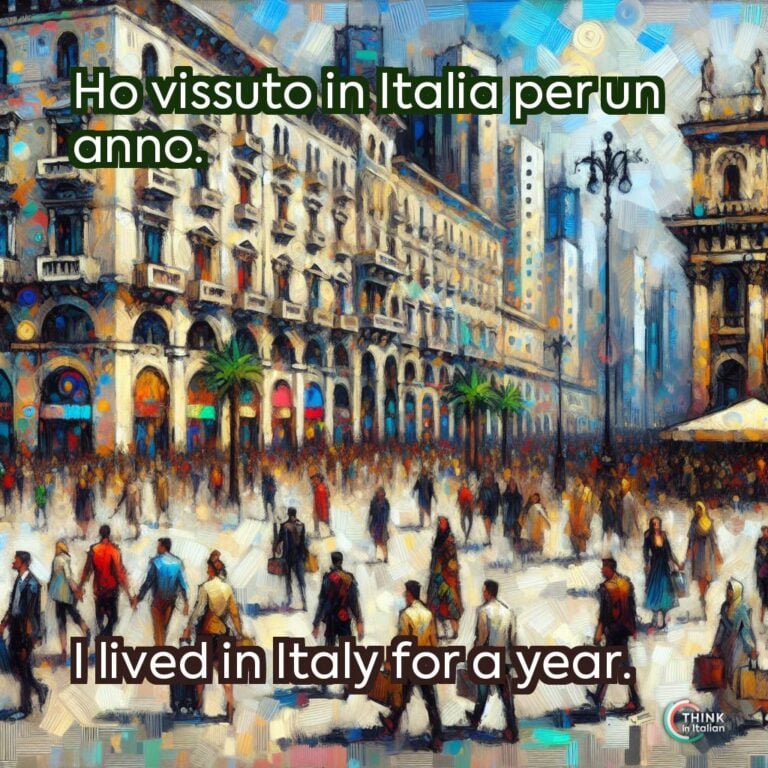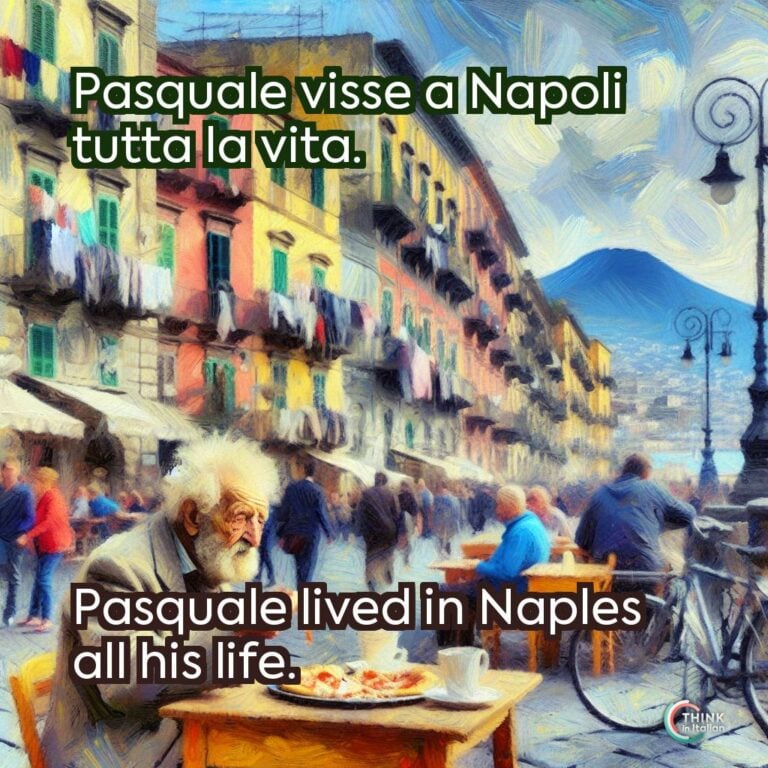The Historical Past in Italian
The Italian passato remoto is a past tense that is used to talk about past events in a narrative way. In fact, it is often also called historical past. It does not have a corresponding translation in English, therefore it is simply translated with the past simple.
It has two tenses: the simple form passato remoto and the compound form trapassato remoto. Here, I will focus on passato remoto only.
Passato Remoto in Italian
Regular Verbs Conjugation
I would like to start as usual by saying that forming the Italian passato remoto is relatively easy, but this time I must admit it is not! However, as with all verb conjugations, you have to drop the ending of the infinitive (-are, –ere, –ire) and add those of the corresponding tense.
In the case of the Italian passato remoto, the endings vary for each of the three verb conjugations:
- -are as in parlare (to talk)
| Io parl-ai | I talked |
| Tu parl-asti | You talked |
| Lui/lei parl-ò | He/she talked |
| Noi parl-ammo | We talked |
| Voi parl-aste | You talked |
| Loro parl-arono | They talked |
- -ere as in credere (to think)
| Io cred-etti | I thought |
| Tu cred-esti | You thought |
| Lui/lei cred-ette | He/she thought |
| Noi cred-emmo | We thought |
| Voi cred-este | You thought |
| Loro cred-ettero | They thought |
- -ire as in sentire (to feel)
| Io sent-ii | I felt |
| Tu sent-isti | You felt |
| Lui/lei sent-ì | He/she felt |
| Noi sent-immo | We felt |
| Voi sent-iste | You felt |
| Loro sent-irono | They felt |
As you can see, it is possible to spot a pattern with the thematic vowels of each conjugation, meaning that most of verbs of the first conjugation display the thematic vowel -a, second conjugations -e, and third conjugation -i.
Irregular Verbs Conjugation
There are two main classes of irregular verbs in the passato remoto: those with a completely irregular conjugation and those with a partially irregular conjugation.
- Completely irregular verbs are essere (to be), dire (to say), and fare (to do). Their conjugations do not follow the pattern of regular verbs at all:
| essere (to be) | dire (to say) | fare (to do) | |
| io | fui | dissi | feci |
| tu | fosti | dicesti | facesti |
| lui, lei | fu | disse | fece |
| noi | fummo | dicemmo | facemmo |
| voi | foste | diceste | faceste |
| loro | furono | dissero | fecero |
- Most of the partially irregular verbs belong to the second conjugation -ere. In these verbs, the conjugation of the personal subjects io, lui/lei, and loro are irregular, while the others are conjugated regularly. In the table below, I wrote only the irregular forms:
| Infinitive Verb | English Translation | io, lui/lei, and loro forms |
| accendere | to turn on | accesi, accese, accesero |
| avere | to have | ebbi, ebbe, ebbero |
| cadere | to fall | caddi, cadde, caddero |
| chiedere | to ask | chiesi, chiese, chiesero |
| chiudere | to close | chiusi, chiuse, chiusero |
| conoscere | to know/meet | conobbi, conobbe, conobbero |
| convincere | to convince | convinsi, convinse, convinsero |
| correre | to run | corsi, corse, corsero |
| crescere | to grow up | crebbi, crebbe, crebbero |
| decidere | to decide | decisi, decisi, decisero |
| difendere | to defend | difesi, difese, difesero |
| discutere | to argue | discussi, discusse, discussero |
| distruggere | to distroy | distrussi, distrusse, distrussero |
| dividere | to divide | divisi, divise, divisero |
| esprimere | to express | espressi, espresse, espressero |
| leggere | to read | lessi, lesse, lessero |
| mettere | to put | misi, mise, misero |
| muovere | to move | mossi, mosse, mossero |
| nascere | to be born | nacqui, nacque, nacquero |
| perdere | to lose | persi, perse, persero |
| prendere | to get/to take | presi, prese, presero |
| rimanere | to stay | rimasi, rimase, rimasero |
| rispondere | to reply | risposi, rispose, risposero |
| rompere | to break | ruppi, ruppe, ruppero |
| sapere | to know | seppi, seppe, seppero |
| sconfiggere | to defeat | sconfissi, sconfisse, sconfissero |
| scrivere | to write | scrissi, scrisse, scrissero |
| spendere | to spend | spesi, spese, spesero |
| togliere | to remove | tolsi, tolse, tolsero |
| uccidere | to kill | uccisi, uccise, uccisero |
| vedere | to see | vidi, vide, videro |
| venire | to come | venni, venne, vennero |
| vincere | to win | vinsi, vinse, vinsero |
| vivere | to live | vissi, visse, vissero |
| volere | to want | volli, volle, vollero |
For instance:
Albert Einstein fu un uomo di grande saggezza.
Albert Einstein was a man of great wisdom.
Facemmo tutto il possibile per riportare alla luce l’affresco di Raffaello.
We did everything possible to bring to light Raffaello’s fresco.
Michelangelo nacque nel 1475.
Michelangelo was born in 1475.
When to use Passato Remoto
Even though passato remoto often sounds old-fashioned for some Italians, you should know that it is still commonly used in the South of Italy and in some parts of Central Italy, like Tuscany. In those areas, it is even used to talk about recent events.
When passato remoto is not used, the best substitution is passato prossimo, which is overall more common and easier.
In Italian, we use the passato remoto in the following cases:
- To describe completed actions in the distant past:
I Romani fondarono Roma nel 753 a.C.
The Romans founded Rome in 753 BC.
- To narrate historical events:
Dante scrisse la Divina Commedia nel XIV secolo.
Dante wrote the Divine Comedy in the 14th century.
- To tell stories or events in literature:
Cenerentola trovò la scarpetta e sposò il principe.
Cinderella found the slipper and married the prince.
Ready to Talk About the Historical Past
Credeva di non poter imparare l’Italiano velocemente, e invece ci riuscì! (He thought he couldn’t learn Italian fast, and instead he managed!)
Well, now you can do it too! You are a step further in your Italian learning journey: I have just embarked the world of historical past. You can now talk about events that happened long time ago, narrate historical events and tell facts in literature.
So, practice the use of this verb tense and unlock new topics and conversations!




